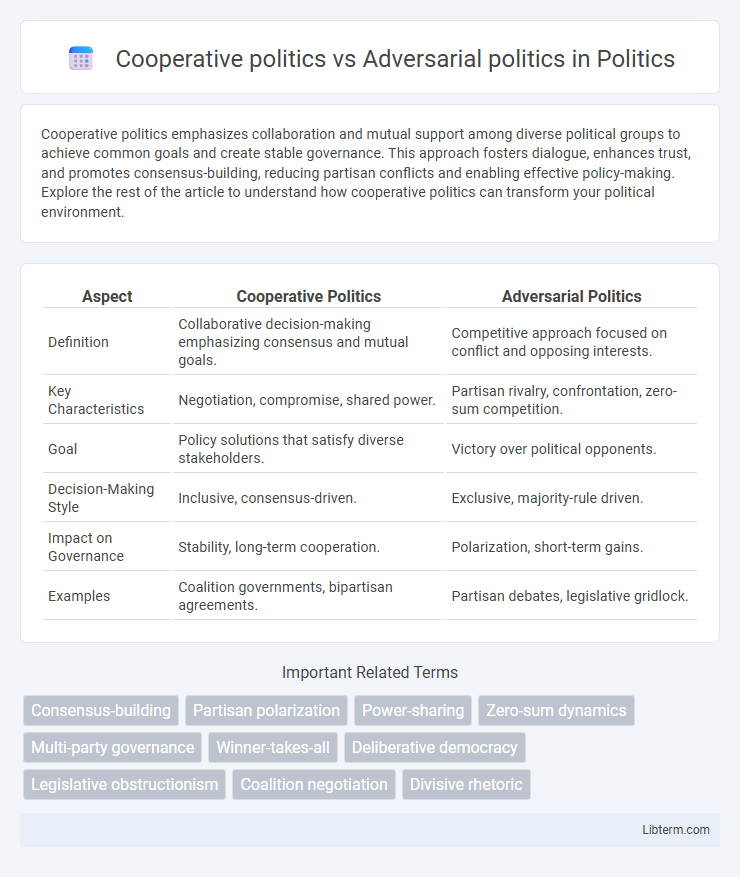Cooperative politics emphasizes collaboration and mutual support among diverse political groups to achieve common goals and create stable governance. This approach fosters dialogue, enhances trust, and promotes consensus-building, reducing partisan conflicts and enabling effective policy-making. Explore the rest of the article to understand how cooperative politics can transform your political environment.
Table of Comparison
| Aspect | Cooperative Politics | Adversarial Politics |
|---|---|---|
| Definition | Collaborative decision-making emphasizing consensus and mutual goals. | Competitive approach focused on conflict and opposing interests. |
| Key Characteristics | Negotiation, compromise, shared power. | Partisan rivalry, confrontation, zero-sum competition. |
| Goal | Policy solutions that satisfy diverse stakeholders. | Victory over political opponents. |
| Decision-Making Style | Inclusive, consensus-driven. | Exclusive, majority-rule driven. |
| Impact on Governance | Stability, long-term cooperation. | Polarization, short-term gains. |
| Examples | Coalition governments, bipartisan agreements. | Partisan debates, legislative gridlock. |
Defining Cooperative Politics: Principles and Practices
Cooperative politics emphasizes collaboration, mutual respect, and consensus-building among diverse political actors to achieve common goals and foster social cohesion. Principles include transparency, inclusive dialogue, and shared decision-making processes that prioritize long-term societal benefits over short-term partisan gains. Practices involve negotiation, compromise, and constructive engagement across political divides to develop sustainable policies and strengthen democratic governance.
Understanding Adversarial Politics: Core Characteristics
Adversarial politics centers on competition and conflict between opposing parties, emphasizing power struggles and ideological divides to secure electoral victories. This approach often results in polarized decision-making, where compromise is limited and party loyalty outweighs consensus-building. Strategic maneuvering and framing issues as binary choices characterize adversarial politics, influencing legislative processes and public discourse.
Historical Overview: Origins of Both Political Approaches
Cooperative politics emerged from early democratic practices emphasizing consensus-building and power-sharing among diverse groups, notably seen in post-World War II European social democracies. Adversarial politics has roots in the development of competitive party systems, such as the British parliamentary model, where organized opposition and conflict drive political decision-making. Both approaches reflect historical responses to managing political pluralism and governance complexity across different cultural and institutional contexts.
Key Differences Between Cooperative and Adversarial Politics
Cooperative politics emphasizes collaboration, mutual respect, and consensus-building among political actors to achieve common goals, fostering stability and long-term policy solutions. In contrast, adversarial politics centers on competition, conflict, and rivalry between opposing parties, often leading to polarization and short-term gains. Key differences include the approach to decision-making, where cooperative politics seeks inclusive dialogue, while adversarial politics relies on confrontation and power struggles.
Impacts on Governance and Policy-Making
Cooperative politics fosters consensus-building and collaboration among diverse stakeholders, resulting in more inclusive and stable policy outcomes that effectively address complex social issues. In contrast, adversarial politics often leads to gridlock and polarization, hindering legislative progress and weakening the implementation of policies by fostering distrust among policymakers. The impact on governance includes enhanced transparency and accountability in cooperative systems, while adversarial approaches can erode public confidence and reduce government efficiency.
Public Perception and Media Representation
Public perception of cooperative politics tends to be more favorable, as it emphasizes collaboration and problem-solving, often portrayed by media as constructive and effective governance. Adversarial politics, characterized by conflict and opposition, frequently receive sensationalized media coverage that highlights polarization and division, impacting public trust negatively. Media representation significantly shapes how citizens evaluate political approaches, with cooperative politics fostering a sense of unity, while adversarial politics may reinforce cynicism and political fatigue.
Success Stories: Examples of Cooperative Politics
Cooperative politics has driven successful governance models in countries like Sweden and Germany, where coalition governments prioritize consensus and policy compromise, resulting in stable economic growth and high social welfare standards. Joint efforts between diverse political parties in these nations have facilitated effective responses to crises, such as Sweden's handling of the COVID-19 pandemic through collaborative public health policies. These examples demonstrate that pragmatic cooperation fosters inclusive decision-making and long-term societal benefits beyond partisan division.
Risks and Consequences of Adversarial Politics
Adversarial politics often leads to increased polarization and legislative gridlock, hindering effective governance and policy implementation. The risk of escalating conflicts between political parties can erode public trust in democratic institutions and reduce voter participation. Persistent adversarial dynamics undermine compromise, resulting in frequent government shutdowns, delayed decision-making, and policy instability.
Strategies to Promote Cooperative Political Culture
Strategies to promote a cooperative political culture emphasize dialogue facilitation, consensus-building, and bipartisan policymaking to reduce polarization and enhance governance effectiveness. Implementing institutional reforms such as proportional representation and cross-party committees encourages collaboration and mutual understanding among political actors. Civic education programs that highlight shared values and the importance of compromise foster citizen engagement and support for cooperative political processes.
The Future of Democratic Systems: Cooperation vs. Adversarialism
Cooperative politics encourages collaboration across party lines to achieve consensus-driven policies, fostering stability and public trust in democratic systems. In contrast, adversarial politics relies on competition and conflict between parties, often leading to polarization and gridlock that can hinder effective governance. The future of democratic systems may depend on balancing these approaches to promote inclusivity while maintaining accountability.
Cooperative politics Infographic

 libterm.com
libterm.com